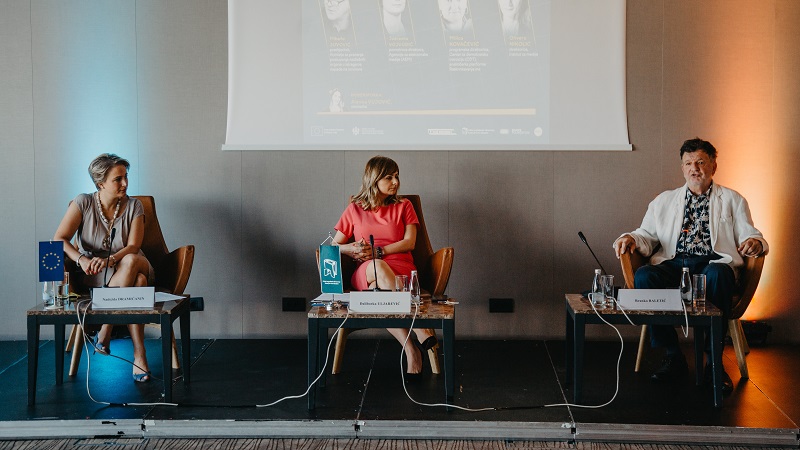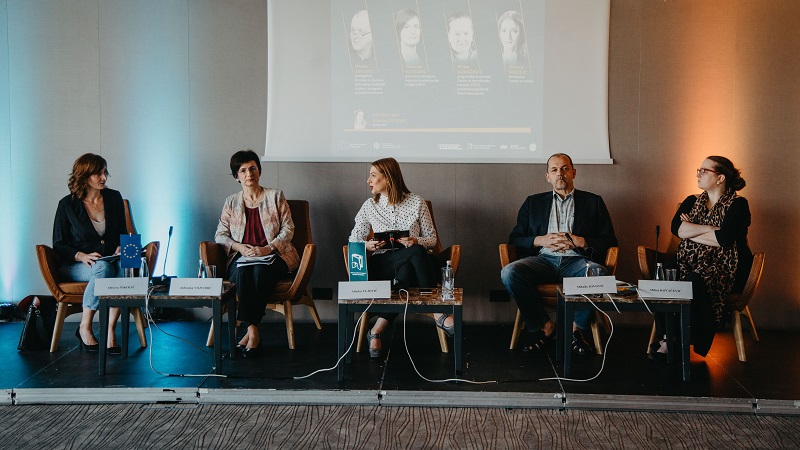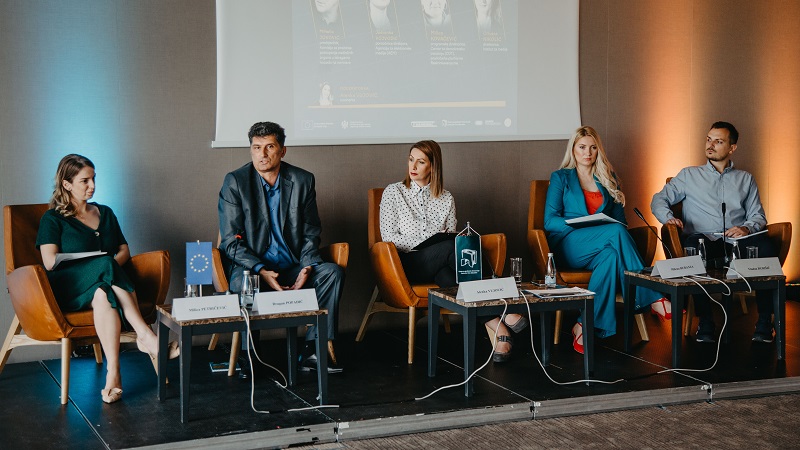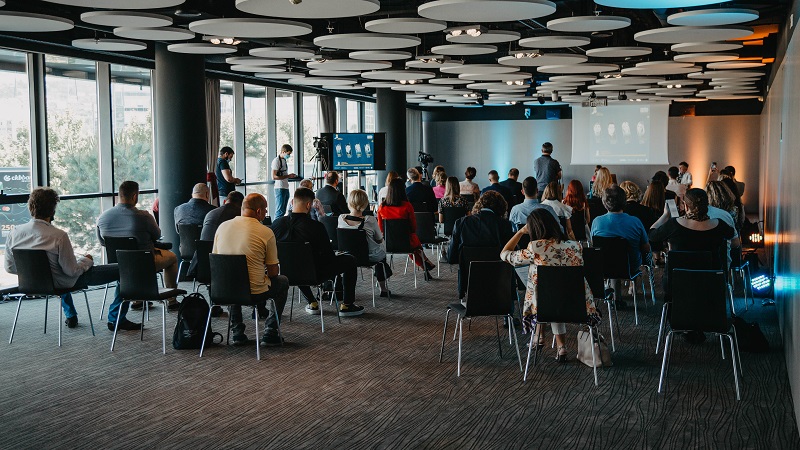Media and journalists in Montenegro cannot do their job professionally without jeopardizing their safety and facing other negative consequences, which not only disrupts freedom of the media but also limits the overall process of democratization and Europeanization of society, it was stated at the conference of the Centre for Civic Education (CCE).
CCE Executive director, Daliborka Uljarević, pointed out at the conference “Media in Montenegro – the struggle for the profession” that the vulnerability of journalists in their efforts to report professionally, along with the poor economic situation, increases self-censorship, assessing that there are fewer continuous and quality approaches to investigative journalism, but also fewer critical consideration of topics of public importance.
“Public funding of the media, and by that I mean all payments to the media, starting with advertising, support through competitions, state aid or other contractual relations, is regulated by the new Law on Media, but it remains to be seen how it will be implemented“, underlined Uljarević.
According to her, RTCG still does not function as a public service, stating that the new Law on RTCG has not improved the manner in which members of the RTCG Council are elected, “so there is still open space for political influence on Council members, and thus the management and editorial team of RTCG as well“.
She reminded of the CCE’s findings on citizens’ perceptions of the media, especially of the part that even half of the respondents believe that the media in Montenegro are not impartial.
“The media are at the core of the further process of democratization and Europeanization of society on the road to the European Union. Dialogue is the key starting point and destination of that process, and we can bring the dialogue to life only if the public interest is above the personal one if we arrange our priorities well and reach an agreement on basic principles“, advised Uljarević.
Uljarević expressed dissatisfaction that the Minister of Public Administration, Digital Society and Media, Tamara Srzentić, did not participate in the event, adding that the Ministry and the Minister herself “are not open enough for the media and the public and open debates“.
Media and communication adviser at the Delegation of the European Union (EU) to Montenegro, Nadežda Dramićanin, said that everything has been a struggle for the last year and a half, stating that “the media are fighting their own special battle, not only for the professional media scene but also for mere survival“.
She noted that freedom of speech and lack of progress in this area have been key issues in all the EU reports already for several years.
“However, the EU understands the problems and obstacles of modern journalism, from which we demand professionalization in an age of incredibly fast-changing circumstances. That is why we provide our political, financial, technical support. We are planning new programmes and we will try to provide the best and most flexible support mechanisms from the new EU budget, which will start to be implemented next year”, said Dramićanin.
The Executive director of the B Film Montenegro, Branko Baletić, said that through work on this project, he “discovered how many great professionals there are in the local media, as well as the amount of passion, dedication and precision with which they perform that job“.
“My deepest respect for those people. I saw how they work with the sound technique that belongs to the fifties and with all other means, how they maintain the programme, keep the local community, fight for all the local problems, while we attend the satanization of some other media“, Baletić pointed out.
He assessed that the problem is not in the local media, but in the so-called mainstream media.
“The ownership model does not release from responsibility for accurate, precise and true information. You can’t say whatever you want in the private media, just because you are not a public service“, concluded Baletić.
Within the panel “Media at the Crossroads – What kind of media scene does Montenegro need?”, the President of the Commission for Monitoring the Actions of Competent Authorities in Investigations of Attacks on Journalists, Mihailo Jovović, assessed that the media in Montenegro have been at the crossroads for a long time, noting that it is difficult to determine in which direction they will go.
“Since the change of government, there have been several positive and negative changes. For the first time in a large group of media, we see that they respect the provision of the Code of Journalists of Montenegro and report critically on those who have the power. It is negative that the divisions on the media scene have deepened“, said Jovović.
He believes that the intolerance towards journalists has increased, stating that it was caused by encouraging divisions in society.
Jovović pointed out that the impunity of attacks on journalists remains a concern, and that the success of the Commission for Monitoring the Actions of Competent Authorities in Investigations of Attacks on Journalists depends on the political will of the people in power and the prosecution.
He thinks that collective self-regulation in Montenegro will start functioning when all the media that should participate in it have a common goal.
The Deputy director of the Agency for Electronic Media (AEM), Jadranka Vojvodić, believes that the media are facing a struggle for survival and a struggle for the attention of viewers and listeners.
“They are in a dilemma whether to stay loyal to the standards, whether to fight for the attention of viewers and listeners or to follow the path of least resistance and indulge in sensationalism, unverified information and various influences on editorial policy, which is a condition for receiving financial support”, said Vojvodić.
As an important novelty, she pointed to the introduction of The Fund for the Systemic Support of Media, stating that this could be a response to the need of the media to receive support for the production of content that cannot be financed from commercial revenues, and thus to strengthen their role by producing content that will deal with life subjects, and not those of entertainment.
Vojvodić expressed hope that the strategic and institutional framework will be completed soon, that funds will be provided for it, as well as that there will be enough professional responsibility to make what was intended implemented.
The Director of the Montenegro Media Institute, Olivera Nikolić, assesses that today the media are increasingly a propaganda drive of certain centres of power.
“People are increasingly deciding based on emotions, affectivity, liking, and not on the basis of accuracy. The media are decreasingly a platform that serves the needs of citizens, public interest, as well as less and less a place for dialogue between different polarized publics, and they themselves contribute in some way to the polarization of society and financing models are based on these principles“, highlighted Nikolić.
She assessed that the media today are not the ones they were a decade or more ago, stating that the model according to which the media work by professional standards and in accordance with the Code of ethics has been violated.
Nikolic believes that we have a crisis because trust in the media has been undermined, “because they do not sufficiently serve the public interest and the needs of citizens “.
She states that it is necessary to find models and ways of financing media that work in the public interest, all to financing media work and content, and not profits.
For the Programme director of the Center for Democratic Transition (CDT) and analyst of the Raskrinkavanje.me platform, Milica Kovačević, a big problem of the media scene is that citizens are often unable to distinguish which media work in the public interest, stating that it is important to point out that not all media are the same, as they are most often perceived by citizens.
She pointed out that “it is important for citizens to recognize the presence of misinformation and biased reporting because it affects their perception of the media and their trust in them“.
Kovačević said that citizens must think about who creates public opinion in Montenegro.
„It is an issue of the economic sustainability of the media, how much they influence on the formation of citizens’ attitudes, however, a democratic issue is much more important. By neglecting that, by refusing to see the problem, we are undermining the Montenegrin media and directly undermining democracy “, Kovačević pointed out.
Kovačević believes that it is necessary to create an environment in which we will be able to see what the media are like when they have all the conditions.
The Director of Radio Tivat, Dragan Popadić, said at the panel “Local media in Montenegro – between the struggle for survival and professional journalism” that there are local public broadcasters that are irreplaceable media when it comes to informing local communities.
“We saw this at the time of the coronavirus epidemic when we, the local broadcasters, passed this exam with high scores. We may not all be professional enough, good enough and hardworking enough in local, public broadcasting, but we are not manipulators. Through our programmes, we do not manipulate the citizens by satisfying political, economic or some other interest groups“, stated Popadić.
He believes that if the law on AVM services is adopted in the proposed form, local public broadcasters will not have problems with funding.
The editor of the portal of Radio Berane, Milena Bubanja, estimated that the media exist because of the citizens, stating that when their focus is on the interest of citizens to know something objectively, timely and truthfully, “then we will get to do our job well“.
She considers that it is a good solution to allocate a fixed amount from the budget of local governments to finance local public broadcasters.
Bubanja assessed that “with the appearance of new media, new communication channels and social networks, there was a decentralization of power and influence of big media“, stating that “it opened a significant space for smaller and local media“.
The Editor-in-chief of the “Voice of Zabjelo” portal, Vladan Đurišić, assesses that “the role of new media and social networks is important, which should not be avoided, but should be governed“.
He proposed the establishment of an association of local media, which, as he said, would facilitate the sustainability of those media.
Đurišić believes that “strengthening public opinion is important” and that he will work on it in the coming period.
The Project manager of Radio KRŠ, Milica Petričević, reminded that this media was founded by a group of students from the Faculty of Political Sciences, who at that time, as she stated, did not know about financial sustainability and media management.
“The goal of founding the radio was to enable students from the faculty to practice journalism, to make it free-spirited and independent. In the beginning, we expected stronger financial support for such an idea, and we received 20 percent of the expected budget”, said Petričević.
She said that Radio Krš has principles that it adheres to, as a consequence of which they suffer financially.
Representatives of local media pointed out the importance of support within this project, but also the importance of securing permanent employees to maintain the continuity of work.
The conference is one of the final activities of the project ”Support to local media – first-hand stories! Support to investigative journalism and media literacy at the local level in Montenegro”, conducted by the B film Montenegro, the CCE, the SHARE Foundation and the Institute for Business and Financial Literacy. The project is funded by the EU through the Delegation of the European Union to Montenegro, and co-financed by the Ministry of Public Administration, Digital Society and Media of the Government of Montenegro.
PR press service




